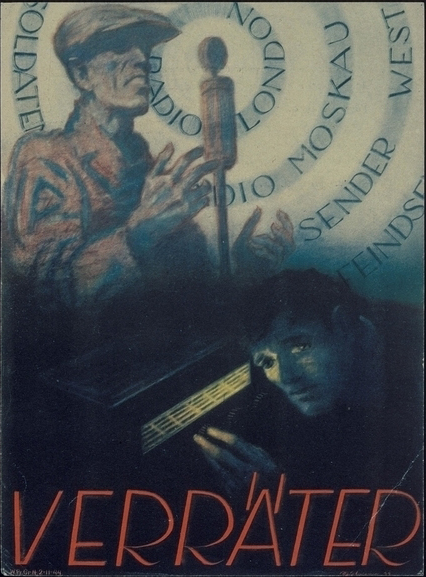Source

Source: Propaganda poster, November 1944. Graphic designer: Max Spielmanns. Bundesarchiv, Plak 003-027-001.
From the very outbreak of hostilities, the Propaganda Ministry was concerned about controlling the airwaves and thereby controlling the official message and narrative about the war. Germans, however, had access to foreign radio broadcasts, which had the potential to disrupt public order and affect popular sentiment about the war. Already in 1939, the Ministry passed a new law that prohibited listening to foreign radio, labeling it as a “radio crime” with a variety of punishments. The ban, however, proved difficult to enforce, and many Germans continued to listen to foreign radio throughout the war. This 1944 poster was part of the regime’s efforts to police radio habits. Portraying a man listening to foreign radio as a “traitor” [Verräter], the poster marked a shift away from earlier propaganda warning Germans that listening to “foreign lies” would have a negative impact on the war effort. Now, the message is more direct: those who listen to foreign broadcasts are enemies within the Volksgemeinschaft. The intent here was to encourage Germans to be on the lookout for such activities, to watch their neighborhoods, and to report anyone suspected of listening to foreign radio. The regime’s encouragement of self-policing was less about promoting social unity among Germans than maintaining their increasingly tenuous grip on public order later in the war.

Source: Propaganda poster, November 1944. Graphic designer: Max Spielmanns. Bundesarchiv, Plak 003-027-001.
Steven Luckert and Susan Bachrach, eds., State of Deception: The Power of Nazi Propaganda (USHMM exhibition catalogue, 2009-11).